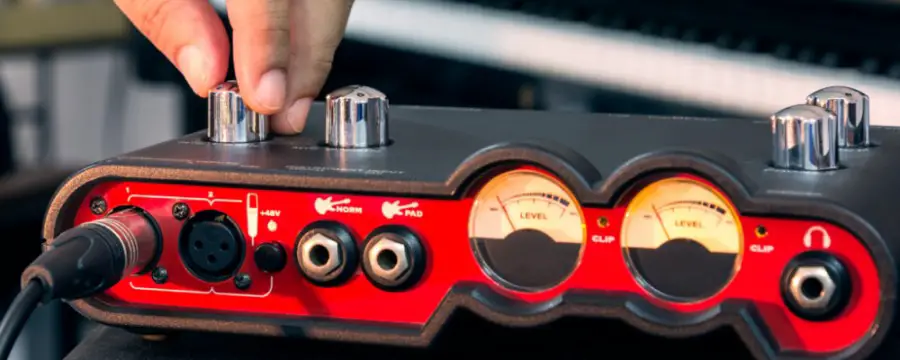Music production can be an incredibly rewarding pursuit, but achieving a professional sound can be challenging. Many factors come into play, from selecting the right sounds and samples to creating a balanced mix and mastering the final track. Whether you’re an aspiring electronic music producer or simply looking to improve the quality of your music, it’s essential to understand the fundamentals of high-quality production.
When it comes to electronic music, the production quality is a key factor that separates the amateur from the professional. A well-produced track not only sounds better but can also help you stand out in a crowded market. In this article, we’ll delve into the top tips for enhancing the professional quality of your music.
Let’s dive in!

1. Invest In Quality Equipment
While it’s true that talent and creativity play crucial roles in music creation, the tools you use can significantly impact the overall production quality of your music. A high-end microphone, audio interface, and pair of studio monitors can significantly enhance the clarity and fidelity of your recordings. Quality gear not only captures your sound accurately but also provides a solid foundation for subsequent stages in the music production process.
2. Choose Quality Sounds
Choosing high-quality sounds is a crucial step in enhancing the professionalism of your music. Typically crafted using advanced recording techniques or synthesized with professional-grade software, these superior sounds contribute significantly to the overall quality of your compositions. By investing time in sourcing or creating exceptional sounds, you increase the likelihood of capturing the attention of both listeners and industry professionals alike.
3. Master The Basics Of Music Theory
A solid understanding of music theory is fundamental to creating better-sounding compositions. Knowing the fundamentals of harmony, melody, and rhythm empowers you to craft engaging and structurally sound music. This knowledge provides a strong foundation for experimentation and creativity, allowing you to make informed musical decisions that resonate with listeners.
4. Learn Proper Mixing Techniques
Mastering mixing techniques is essential for achieving a professional sound. Balancing levels, panning, EQ, and compression are just a few of the critical skills to refine. Paying attention to the spatial placement of elements within the mix and ensuring each component is clear and distinct contribute to a polished and well-crafted final product.

5. Adapt To Trends Without Losing Identity
Staying relevant in the ever-evolving music landscape is important, but it’s equally crucial to maintain your artistic identity. Embrace contemporary trends while infusing your unique style to create a sound that’s both current and unmistakably yours. Striking this balance ensures your music remains fresh and appealing without sacrificing authenticity.
6. Pay Attention To Detail
The devil is in the details when it comes to professional music production. Fine-tune every aspect of your music, from subtle nuances in performance to meticulous editing. Small adjustments, such as precise timing, pitch correction, and strategic sound curation, collectively contribute to a more polished and professional end result.
7. Optimize Your Room Acoustics
The acoustics of your recording space significantly impact the overall sound quality. Invest time and resources in optimizing your room acoustics by adding acoustic treatment and ensuring a balanced sound environment. This effort minimizes unwanted reflections and ensures accurate monitoring, ultimately enhancing the professional quality of your recordings.
8. Employ Quality Recording Techniques
Understanding and implementing proper recording techniques, such as optimal mic placement, is vital for capturing the best possible sound during recording. Experimenting with different setups for each instrument or vocal allows you to find the perfect combination for a professional and balanced mix. Attention to detail during the recording process minimizes the need for extensive corrections in later stages of production.

9. Use A Metronome
A metronome is a simple yet powerful tool to improve the precision and professionalism of your music. Playing or programming to a consistent tempo ensures a tight and cohesive performance. Whether recording live instruments or programming electronic beats, a metronome is your ally in maintaining rhythmic accuracy.
10. Utilize Automation
Automation is a powerful tool for infusing dynamics and movement into your music. Experiment with automating effects, volume changes, and other parameters to add nuance and sophistication to your tracks. Strategic automation can breathe life into your compositions and help stop your tracks from sounding repetitive.
11. Focus On Arrangement
Effective arrangement is key to creating a professional and engaging musical journey. Ensure that each section of your composition flows logically, with a well-balanced structure that keeps your audience captivated. Pay attention to transitions between sections, creating a cohesive flow that captivates listeners from start to finish.
12. Learn Your Software
Thoroughly understanding your Digital Audio Workstation (DAW) or other software is crucial for efficient and effective music production. Understanding the ins and outs of your chosen DAW allows you to navigate seamlessly, experiment with advanced features, and streamline your workflow. Mastering your tools allows you to unleash your creativity and navigate the production process with confidence.

13. Use Reference Tracks
Comparing your work to professionally produced tracks provides valuable insights into industry standards and sonic expectations. Reference tracks help you identify areas for improvement in your own mixes, guiding you towards achieving a more polished and better overall sound. Regularly referencing established tracks can refine your ear and enhance your production skills.
14. Request Feedback & Make Revisions
Seeking feedback from peers, musicians, or producers is a valuable part of the music production process. Constructive criticism helps refine your work, offering insights that contribute to a more professional and polished final product. Additionally, when receiving feedback, make sure to approach revisions with an open mind and a commitment to continuous improvement.
15. Collaborate & Network
Building connections within the music industry is essential for growth. Collaborate with other musicians, vocalists, or producers to gain new perspectives and insights. Networking opens doors to opportunities, potentially leading to collaborations that elevate the quality and reach of your music.
16. Get Your Track Mastered
Mastering is the final step in the production process that adds the finishing touches to your music. A professional mastering engineer can fine-tune the overall balance, dynamics, and clarity of your tracks. Investing in mastering services ensures that your music meets industry standards and sounds polished and consistent across different playback systems.
Conclusion
In conclusion, achieving a professional sound in music production requires a multifaceted approach encompassing technical skill, creativity, and a commitment to excellence. By incorporating these tips into your workflow and staying dedicated to continuous improvement, you’ll be well on your way to creating music that not only sounds professional but also stands out in a competitive musical landscape.
Keep honing your craft, embracing collaboration, and utilizing the wealth of resources available to you in the ever-evolving world of music production.
Related Posts:
13 Tips To Help You Make Better Music
Best Music Production Software | Top 5 DAWs
Mixing vs. Mastering: What’s The Difference?
Want To Know More?
Here at Live Aspects, we have dozens of useful lessons and tutorials created to enhance your music production skills and help speed up the learning process. You can access our huge range of music theory lessons and production tips and tricks here.